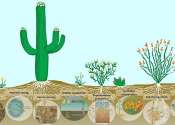Drill bits on rover could contaminate Mars
For all the hopes NASA has pinned on the rover it deposited on Mars last month, one wish has gone unspoken: Please don't find water.

For all the hopes NASA has pinned on the rover it deposited on Mars last month, one wish has gone unspoken: Please don't find water.
Space Exploration
Sep 16, 2012
48
1

Lakes and ponds are the final resting place for many of the Earth's plants. Rivers collect much of the planet's dead organic matter, transporting it to rest in calmer waters.
Environment
Nov 19, 2019
1
20

An international team of researchers led by Queen Mary University of London have discovered that microorganisms buried in sediment beneath the seafloor can survive on less energy than was previously known to support life. ...
Earth Sciences
Aug 5, 2020
1
1132

A bowl of salad contains more than vitamins and minerals. Plant matter also includes remnants of the hormones plants produce to control how they grow, age, and manage water intake. Recently, scientists have reported that ...
Biotechnology
Aug 22, 2017
0
1187

As permafrost soils thaw under the influence of global warming, communities of soil microbes act as potent amplifiers of global climate change, an international study has shown.
Environment
Oct 22, 2014
26
0

Desertification is a significant problem for arid, semi-arid and dry sub-humid regions of Earth, whereby grasslands and shrublands become a comparatively barren desert as vegetation disappears over time. This poses an extreme ...

Each of us is only half human. The other half is microbial. Trillions of viruses, fungi, bacteria and other microscopic organisms coat our skin and line our vital organs.
Cell & Microbiology
Oct 29, 2018
2
348

The communities formed by human gut microbes can now be predicted more accurately with a new computer model developed in a collaboration between biologists and engineers, led by the University of Michigan and the University ...
Cell & Microbiology
Jul 7, 2022
1
163

Among the more peculiar organisms that inhabit our Earth exists a bacterium that turns water-soluble gold into microscopic nuggets of solid gold, scientists said Sunday.
Biochemistry
Feb 3, 2013
2
0

Human waste may one day be a valuable resource for astronauts on deep-space missions. Now, a Penn State research team has shown that it is possible to rapidly break down solid and liquid waste to grow food with a series of ...
Space Exploration
Jan 25, 2018
4
715